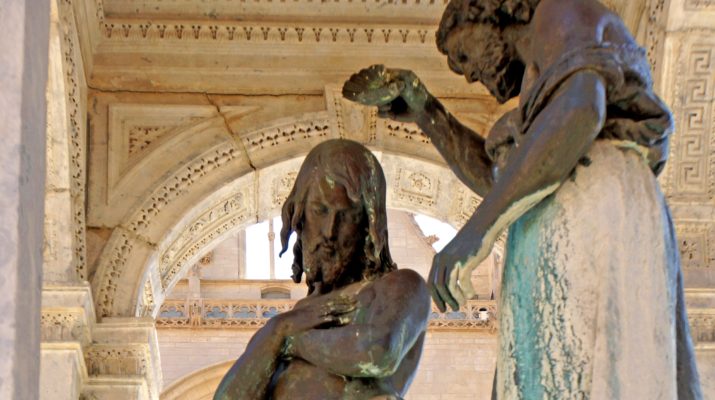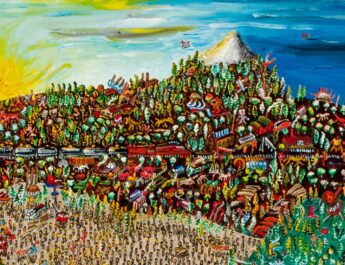Matthew 3:1-6, 11-17
A Women’s Lectionary 8
1 In those daysI JohnII the BaptistIII appearedIV
I “days” = hemera. Perhaps from hemai (to sit). This is day, time, or daybreak.
II “John” = Ioannes. From Hebrew yochanan (Johanan); from Yehochanan (“the Lord has been gracious”); {from YHVH (proper name of the God of Israel); {from havah (to become); from hayah (to be, exist, happen)} + chanan (beseech, show favor, be gracious; properly, to bend in kindness to someone with less status). This is John, meaning “the Lord has been gracious.”
III “Baptist” = Baptistes. 12x in NT. From baptizo (to submerge, wash, or immerse; used specially for baptism); from bapto (to dip or dye; to entirely cover with liquid, to stain). This is baptizer or Baptist. The term is only used for John the Baptist.
IV “appeared” = paraginomai. From para (from beside, by) + ginomai (to come into being, to happen, become, be born; to emerge from one state or condition to another; this is coming into being with the sense of movement or growth). This is to arrive, appear, reach. It implies appearing publicly.
in the wildernessV of Judea,VI proclaiming,VII, VIII
V “wilderness” = eremos. Properly, a place that is not settled or farmed, not populated. It could be a deserted area or a desert place. It could be seen as secluded, solitary, or lonesome. Any kind of vegetation is sparse, but so are people generally.
VI “Judea” = Ioudaia. From Hebrew Yehudah (Judah, son of Jacob, his tribal descendants, a name for the southern kingdom. Literally, it means praised); probably from yadah (to throw one’s hands into the air in a gesture of praise); from yad (hand). This is Judea, which was a Roman province.
VII “proclaiming” = kerusso. This is to proclaim, preach, publish. Properly, it is to act as a herald – announcing something publicly with confidence and/or to persuade.
VIII {untranslated} = lego. This is to speak, say, name, call, command. It is generally to convey verbally.
2 “Repent,IX for the kingdomX of heavenXI has come near.”XII
IX “repent” = metanoeo. From meta (with, among, after, beyond) + noieo (to perceive, think, understand); {from nous (mind, understanding, reasoning faculty, intellect, capacity to reflect)}. This is to change how one thinks, to reconsider, to repent. It refers to a change of thinking, which means a change of purpose and behavior.
X “kingdom” = basileia. From basileus (king, emperor, sovereign); probably from basis (step, hence foot; a pace); from baino (to walk, to go). This is kingdom, rule, authority, sovereignty, royalty, a realm.
XI “heaven” = ouranos. May be related to oros (mountain, hill) with the notion of height. This is the air, the sky, the atmosphere, and heaven. It is the sky that is visible and the spiritual heaven where God dwells. Heaven implies happiness, power, and eternity.
XII “come near” = eggizo. From eggus (nearby or near in time). This is extremely close by – approaching, at hand, immediately imminent.
3 This is the one of whom the prophetXIII IsaiahXIV spoke when he said,
“The voiceXV of one cryingXVI out in the wilderness:
XIII “prophet” = prophetes. From pro (before, in front of, earlier than) + phemi (to declare, say, use contrasts in speaking to shed light on one point of view); {from phao (to shine) or phaino (to bring light, cause to appear, shine, become visible or clear)}. This is a prophet or poet – one who speaks with inspiration from God.
XIV “Isaiah” = Esaias. Related to “John” in v1. From Hebrew Yeshayahu (Isaiah, “salvation of the Lord”); {from yasha (to deliver, defend, help, preserve, rescue; properly, to be open, wide or free, which implies being safe; to free someone) + Yah (the shortened form of the name of the God of Israel; God, Lord); {from YHVH (see note II above)}. This is Isaiah, meaning “salvation of the Lord.”
XV “voice” = phone. Probably from phemi (to declare, say, use contrasts in speaking to shed light on one point of view); {from phao (to shine) or phaino (to bring light, cause to appear, shine, become visible or clear). This is a voice, sound, tone or noise. It can also be a language or dialect.
XVI “crying” = boao. 12x in NT. From boe (a cry or shout). This is cry out, make a distress call, ask for desperately need assistance.
‘PrepareXVII the wayXVIII of the Lord,XIX
makeXX his pathsXXI straight.’”XXII
XVII “prepare” = hetoimazo. From hetoimos (make ready, be ready because of being prepared, standing by, adjusted; ready to meet some opportunity or challenge). This is to prepare or provide.
XVIII “way” = hodos. This is way, road, path, or journey. It can imply progress along a route.
XIX “Lord” = Kurios. From kuros (authority, supremacy). This is a respectful address meaning master or sir. It refers to one who has control or power greater than one’s own. So, it was also applied to God and Jesus as Master or Lord.
XX “make” = poieo. This is to make, do, act, construct, abide, or cause.
XXI “paths” = tribos. 3x in NT– all in the proclamation of John the Baptist in Matthew, Mark, and Luke. From tribo (to rub or thresh). This is a rut or path that is made from regular use – a road or highway.
XXII “straight” = euthus. 8x in NT. Perhaps from eu (good, well, well done, rightly) + tithemi (to place, lay, set, establish). This is immediately, upright, straight and not crooked.
4 Now John woreXXIII clothingXXIV of camel’sXXV hairXXVI
XXIII “wore” = echo. This is have, hold, possess.
XXIV “clothing” = enduma. 8x in NT. From enduo (to clothe, put on in a literal or figurative sense); {from en (in, on, at, by, with, within) + duno (to enter, sink into; can also be set like the sun); {from duo (to sink)}}. This is clothing, especially outer robes. This is clothing as something one sinks into.
XXV “camel’s” = kamelos. 6x in NT. From Hebrew gamal (camel); from gamal (how one deals with someone whether positively or negatively – so to reward, requite; to wean or the work that goes into something ripening). This is a camel.
XXVI “hair” = thrix. 15x in NT. This is hair, whether human or animal.
with a leatherXXVII beltXXVIII around his waist,XXIX and his foodXXX was locustsXXXI and wildXXXII honey.
XXVII “leather” = dermatinos. 2x in NT. From derma (the skin, animal hide); from dero (to skin, hit, flog, flay, thrash). This is leather – something made of skin.
XXVIII “belt” = zone. 8x in NT. From zonnumi (to gird up – to tighten the belt so one can work or move quickly). This is belt, sash, waistband – the place where one puts the purse.
XXIX “waist” = osphus. 8x in NT. This is waist, hips, or loins.
XXX “food” = trophe. 16x in NT. Perhaps from trepho (to bring up, rear, nourish, fatten, nurse; properly, to enlarge through proper nourishment). This is nourishment in a literal or figurative sense. By implication, it can be ration or wages.
XXXI “locusts” = akris. 4x in NT. Perhaps from the same as akron (end, tip, top, extreme); related to akantha (thorn bush, thorn); from ake (point, edge). This is locust.
XXXII “wild” = agrios. 3x in NT. From agros (a field as a place where one grows crops or pastures cattle; a farm or lands). This is related to the country or fields. It can mean natural, wild, or fierce.
5 Then the people of JerusalemXXXIII and allXXXIV Judea were going outXXXV to him, and all the region along the Jordan,XXXVI
XXXIII “Jerusalem” = Hierosoluma. From Hebrew yerushalaim (probably foundation of peace); {from yarah (to throw, shoot, be stunned; to flow as water so figuratively to instruct or teach) + shalam (to make amends, to be complete or sound)}. This is Jerusalem, dwelling of peace.
XXXIV “all” = pas. This is all or every.
XXXV “going out” = ekporeuomai. From ek (from, from out of) + poreuomai (to go, travel, journey, die; refers to transporting things from one place to another; focuses on the personal significance of the destination); {from poros (passageway)}. This is to go forth, depart from, be spoken, flow out, project. This word emphasizes the result a process or passage – how it impacts the person or thing.
XXXVI “Jordan” = Iordanes. 15x in NT. From Hebrew yarden (Jordan river, meaning “descending”); from yarad (to go down, descend; going down in a literal or figurative sense; going to the shore or a boundary, bringing down an enemy). This is the Jordan River, meaning “descending.”
6 and they were baptizedXXXVII by him in the riverXXXVIII Jordan, confessingXXXIX their sins.XL
XXXVII “baptized” = baptizo. Related to “Baptist” in v1. See note III above.
XXXVIII “river” = potamos. 17x in NT. From pino (to drink). This is a river, brook, or water. It can also be a riverbed flowing with heavy rain or melted snow (like an arroyo).
XXXIX “confessing” = exomologeo. 10x in NT. From ek (from, from out of) + homologeo (to agree, speak the same, declare, promise, praise, celebrate; to align with, express the same conclusion, endorse); {from homologos (of one mind); {from homos (the same) + lego (to say, speak, tell)}}. This is agree, consent, or acknowledge. It can also be confess, give thanks, or praise. It includes an open, public, unabashed declaration.
XL “sins” = hamartia. From hamartano (to miss the mark, do wrong, make a mistake, sin); {from a (not) + meros (a part or share)}. Literally, this means not having one’s share or portion – like not receiving inheritance or what was allotted to you. This word means missing the mark so it is used for guilt, fault, and acts of sin.
11 “IXLI baptize you with waterXLII for repentance,XLIII but one who is more powerfulXLIV than I is comingXLV after me;
XLI {untranslated} = men. This is truly, indeed, even, in fact. Often, it is not translated, but used to emphasize affirmation.
XLII “water” = hudor. Perhaps from huetos (rain); from huo (to rain). This is water literal or figurative. It is one of the roots that “hydrogen” and “hydroelectric” come from.
XLIII “repentance” = metanoia. From meta (with, among, after, beyond) + noieo (see note IX above)}. This is literally to change one’s mind – to choose to think differently and so to act differently because of a moral compunction. It is an intentional change to the inner self. This word shares a root with the English “paranoia.”
XLIV “more powerful” = ischuros. From ischuo (to be strong, healthy and vigorous, able, have power, prevail; strength that engages a resisting force); from ischus (strength, might, power, force, ability; power that engages immediate resistance). This is strong – first of physical strength. Later, also used figuratively for forcible, powerful, mighty, vehement, or sure.
XLV “coming” = erchomai. This is to come or go.
I am not worthyXLVI to carryXLVII his sandals.XLVIII
XLVI “worthy” = hikanos. From hikneomai (to reach, come to, attain). This is sufficient, suitable, adequate, competent, ample.
XLVII “carry” = bastazo. Perhaps from the base of basis (step, hence foot; a pace); from baino (to walk, to go). This is to lift in a literal of figurative sense. It can also mean take up, carry, bear, or remove. Figuratively, it can mean declare, endure, or sustain.
XLVIII “sandals” = hupodema. 10x in NT. From hupodeo (to bind under wear on the feet); {from hupo (by, under, about, subordinate to) + deo (to tie, bind, fasten, impel, compel; to declare something against the law or prohibited)}. This is a sandal – something bound under the sole.
He will baptize you with the HolyXLIX SpiritL and fire.LI
XLIX “Holy” = Hagios. From hagnos (holy, sacred, pure ethically, ritually, or ceremonially; prepared for worship, chaste, unadulterated, pure to the core; undefiled by sin; figurative for innocent, modest, perfect). God is totally different from humanity and thus set apart. That which is consecrated to worship God (elements of worship) or to serve God (as the saints) are holy because they are now set apart for God’s purposes. Holy because important to God. This is sacred physically, pure. It can be morally blameless or ceremonially consecrated.
L “Spirit” = Pneuma. From pneo (to blow, breath, breathe hard). This is wind, breath, or ghost. A breeze or a blast or air, a breath. Figuratively used for a spirit, the human soul or part of us that is rational. It is also used supernaturally for angels, demons, God, and the Holy Spirit. This is where pneumonia comes from.
LI “fire” = pur. This is fire, lightning, heat from the sun. Figuratively, it can refer to strife or trials.
12 His winnowing fork is in his hand,LII and he will clearLIII his threshing floorLIV
LII “hand” = cheir. This is the hand in a literal sense. Figuratively, the hand is the means a person uses to accomplish things so it can also mean power, means, or instrument.
LIII “clear” = diakatharizo. 2x in NT. From dia (through, because of, across, thoroughly) + katharizo (to cleanse, make clean, purify, purge, or declare to be clean; includes cleansing in a literal, ritual, or spiritual sense); {from katharos (clean, clear, pure, unstained; clean in a literal, ritual, or spiritual sense; so, also guiltless, innocent or upright; something that is pure because it has been separated from the negative substance or aspect; spiritually clean because of God’s act of purifying)}. This is cleanse or purge thoroughly.
LIV “threshing floor” = halon. 2x in NT. From halos (threshing floor); probably from helisso (to roll up, coil, wrap). This is threshing floor as a place where grain and chaff are rolled.
and will gatherLV his wheatLVI into the granary;LVII but the chaffLVIII he will burnLIX with unquenchableLX fire.”
LV “gather” = sunago. From sun (with, together with, closely associated) + ago (to lead, bring, carry, guide, go, drive). This is to lead together and so to assemble, bring together, welcome with hospitality, or entertain. In the sense of assembly, this is the root of the word “synagogue.”
LVI “wheat” = sitos. 15x in NT. This is used for any kind of grain that you can eat. It is usually wheat, but it can also be barley and other grains.
LVII “granary” = apotheke. Related to “straight” in v3. 6x in NT. From apotithemi (to put aside, put away, renounce); {from apo (from, away from) + tithemi (see note XXII above)} This is somewhere that things are stored like a barn or repository.
LVIII “chaff” = achuron. 2x in NT. Perhaps from cheo (to shed). This is chaff.
LIX “burn” = katakaio. 12x in NT. From kata (down, against, among) + kaio (to burn, light, kindle). This is to burn up – entirely consume.
LX “unquenchable” = asbestos. 4x in NT. From a (not, without) + sbestos (extinguished); {from sbennumi (to quench or extinguish in a literal or figurative sense; to suppress)}. This is not extinguished, unquenchable. It can imply continual. This is where the word “asbestos” comes from.
13 Then JesusLXI cameLXII from GalileeLXIII to John at the Jordan, to be baptized by him. 14 John would have preventedLXIV him, saying, “I needLXV to be baptized by you, and do you come to me?”
LXI “Jesus” = Iesous. Related to “John” in v1 & “Isaiah” in v3. From Hebrew Yehoshua (Joshua, the Lord is salvation); {from YHVH (see note II above) + yasha (see note XIV above)}. This is Jesus or Joshua in Greek – the Lord saves or the Lord is salvation.
LXII “came” = paraginomai. Same as “appeared” in v1. See note IV above.
LXIII “Galilee” = Galilaia. From Hebrew galil (cylinder, circuit, district); from galal (to roll in a literal or figurative sense, roll away, roll down, wallow, remove, trust). This is Galilee, meaning perhaps region or cylinder.
LXIV “prevented” = diakoluo. 1x in NT. From dia (through, because of, across, thoroughly) + koluo (to hinder or prevent, restrain, refuse. It can be prevent, whether through words or actions); {probably from the same as kolazo (to punish, particularly to punish slaves so that they are restricted or chastised); from kolos (docked, dwarf)}. This is to hinder, forbid, prevent, or prohibit.
LXV “need” = chreia. From chraomai (to use, make use of, give what is needed, act in a specific way, request); related to chre (what is proper, fitting, or necessary). This is the is task, business, or affair. It can also be need, want, or destitution.
15 But Jesus answered him, “Let it beLXVI so now; for it is properLXVII for us in this way to fulfillLXVIII all righteousness.”LXIX Then he consented.LXX
LXVI “let it be” = aphiemi. From apo (from, away from) + hiemi (to send). This is send away, release, permit, forgive, allow to depart, discharge, or send forth.
LXVII “proper” = prepo. 7x in NT. This is fitting, suitable, conspicuous, proper.
LXVIII “fulfill” = pleroo. From pleres (to be full, complete, abounding in, occupied with). This is to fill, make full or complete. Properly, this is filling something up to the maximum extent that it can be filled – an appropriate amount for its individual capacity. So, this is used figuratively for furnish, influence, satisfy, finish, preach, perfect, and fulfill.
LXIX “righteousness” = dikaiosune. From dikaios (correct, righteous – implies innocent; this is that which conforms to God’s notion of justice, uprightness); from dike (the principle of justice; that which is right in a way that is very clear; a decision or the execution of that decision; originally, this word was for custom or usage; evolved to include the process of law, judicial hearing, execution of sentence, penalty, and even vengeance; more commonly, it refers to what is right); may be from deiknumi (to show, point out, exhibit; figurative for teach, demonstrate, make known). This is judicial or divine approval of character or action. This is righteousness, justice, justness, divine righteousness.
LXX “consented” = aphiemi. Same as “let it be” in v15. See note LXVI above.
16 And when Jesus had been baptized, just asLXXI he came upLXXII from the water, suddenlyLXIII the heavens were openedLXXIV to him
LXXI “just as” = eutheos. Related to “straight” in v3 & “granary” in v12. From euthus (see note XXII above). This is directly, soon, at once.
LXXII “came up” = anabaino. Related to “carry” in v11. From ana (up, back, among, again, anew) + the same as basis (see note X above). This is to come up in a literal or figurative sense – ascent, rise, climb, enter.
LXXIII “suddenly” = idou. From eido (to be aware, see, know, remember, appreciate). This is see! Lo! Behold! Look! Used to express surprise and or draw attention to the statement.
LXXIV “opened” = anoigo. From ana (up, back, again, among, between, anew) + oigo (to open). This is to open in literal or figurative sense.
and he sawLXXV the Spirit of GodLXXVI descendingLXXVII like a doveLXXVIII and alightingLXXIX on him.
LXXV “saw” = horao. To see, perceive, attend to, look upon, experience. Properly, to stare at and so implying clear discernment. This, by extension, would indicate attending to what was seen and learned. This is to see, often with a metaphorical sense. Can include inward spiritual seeing.
LXXVI “God” = Theos. From Proto-Indo-European origins, meaning do, put, place. This is God or a god in general.
LXXVII “descending” = katabaino. Related to “carry” in v11 & “came up” in v16. From kata (down, against, throughout, among) + baino (see note X above). This is to come down whether from the sky to the ground or from higher ground to lower. It can be used in a literal or figurative sense.
LXXVIII “dove” = peristera. 10x in NT. This is dove or pigeon.
LXXIX “alighting” = erchomai. Same as “coming” in v11. See note XLV above.
17 AndLXXX a voice from heaven said, “This is my Son,LXXXI the Beloved,LXXXII with whom I am well pleased.”LXXXIII
LXXX {untranslated} = idou. Same as “suddenly” in v16. See note LXXIII above.
LXXXI “Son” = huios. This is son, descendant – a son whether natural born or adopted. It can be used figuratively for other forms of kinship.
LXXXII “Beloved” = agapetos. From agape (love, goodwill, benevolence; God’s divine love); from agapao (to love, take pleasure in, esteem; to prefer). This is Beloved or very dear one. It is a title for the Messiah, but also for Christians. Properly, this is one who personally experiences God’s love.
LXXXIII “am well pleased” = eudokeo. From eu (good, well, well done) + dokeo (to have an opinion, seem, appear, suppose; a personal judgment; to think); from dokos (opinion). This is to think well of, to be pleased or resolved. Properly, this is what someone finds good or acceptable – approving of some action or generally thinking well of.
Image credit: “Baptism of Christ” in front of St. John’s Cathedral in Lyon, France.




